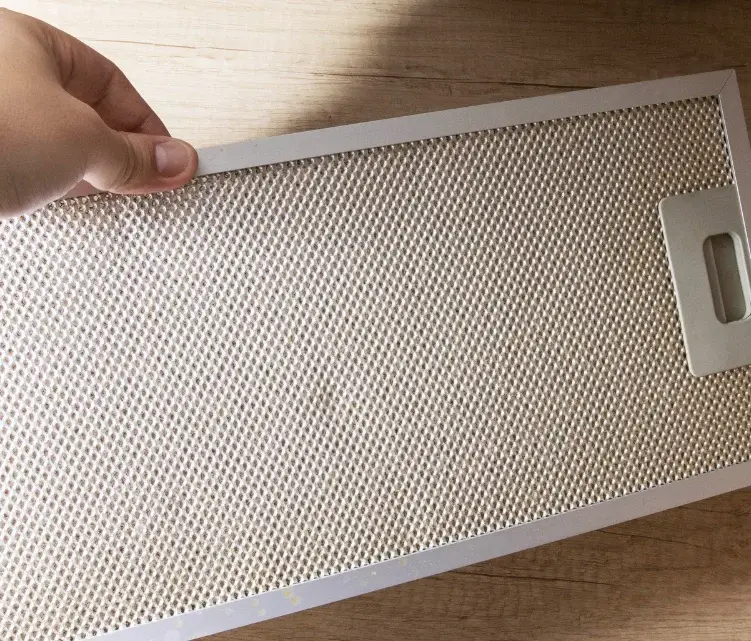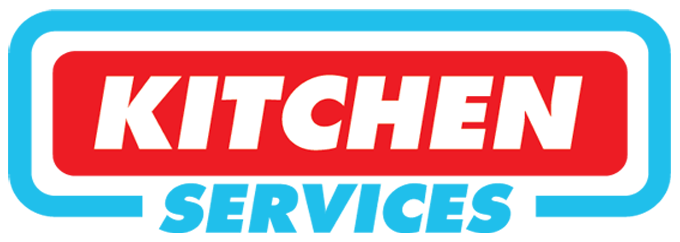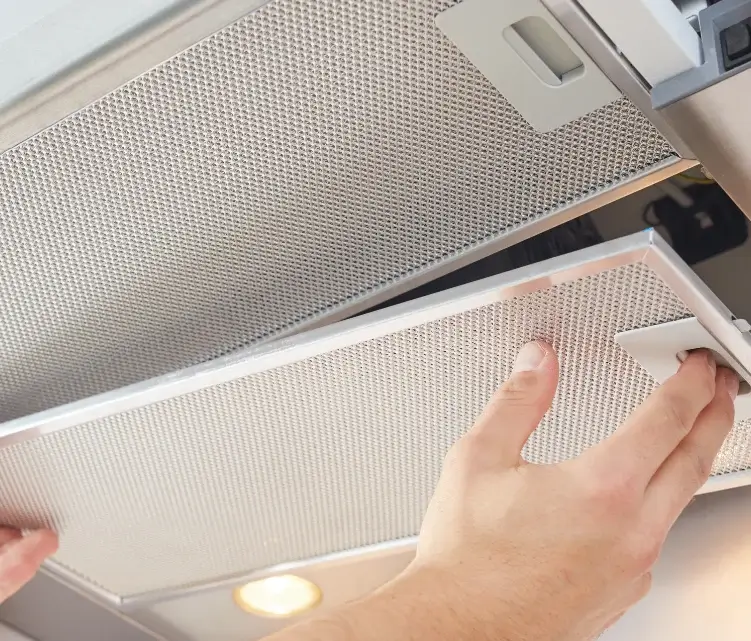Grease Filters Cleaning and Maintenance
WoolGuard Disposable Grease Filters for commercial kitchens reduce the cost of grease filter exchange and kitchen hood cleaning services. Traditional grease filters allow most of the grease to enter the kitchen exhaust system and accumulate in the hood plenum, grease duct, and exhaust blower fan resulting in multiple hood cleanings several times per year.
By switching to disposable kitchen grease filters, you will capture up to an impressive 98% of the kitchen grease generated during the cooking process. As a result, the amount of grease entering the kitchen exhaust system is minimal, which greatly reduces the number of hood cleanings required to meet health and fire department code requirements.
Because only a small percentage of grease comes in contact with the metal frame of the grease filter, ongoing labor, water and chemical costs related with grease filter cleaning is reduced significantly.
Why WoolGuard Grease Filters by Kitchen Services?
WoolGuard disposable kitchen grease filters capture up to 98% of the grease before entering the kitchen hood exhaust system. This greatly decreases the grease build-up in the hood plenum, grease duct work, exhaust fans, and rooftops, minimizing the risk of a catastrophic fire.
WoolGuard Disposable Grease Filters by Kitchen Services are made from 100% wool, a naturally fire-retardant material. Wool, the filter media, is carbon-neutral and will break down in the landfill.
Why Install WoolGuard Disposable Grease Filters?
WoolGuard Disposable Grease Filters come with many benefits. The dirt oil and grease build-up begins to gather in grease filters. Later, they travel into your hood plenum to grease ducts, all the way to the exhaust fans.
By installing WoolGuard Disposable Grease Filters, about 20-40% of airborne grease and oil will be trapped. This leads to a build-up of kitchen grease that needs to be cleaned frequently in order to meet health and fire codes and stay in compliance with insurance requirements. WoolGuard Disposable Grease Filters provide the ultimate protection for your restaurant kitchen.
1- Grease Filter Cleaning and Kitchen Exhaust Maintenance Costs Are Expensive
Most commercial and restaurant kitchens do their kitchen grease filter exhaust cleaning several times per month which can add to expensive labor and materials costs. Emergency exhaust blower repairs due to grease in the exhaust ducts can be very expensive and often lead to the kitchen being shut down for an hour while the repairs are completed.
Water usage can be very high due to frequent grease filter cleaning and the chemical degreasers used in the process are not only expensive but can be very toxic to humans. Cleaning products that are flushed down the drain usually end up washing in the oceans and can have a serious impact on the environment.
Disposable kitchen grease filters from WoolGuard Filters by Kitchen Services reduce labor and material costs associated with grease filter cleaning by preventing grease to enter the kitchen exhaust system in the first place.
2- Fire Risk Related to Grease Filters
Kitchen fires in restaurants are usually related to issues with the kitchen exhaust system.
Fire statistics from the United States, Australia and the United Kingdom show that fires in restaurants primarily occur in the kitchens. The ignition of cooking materials accounts for almost half of all commercial kitchen fires.
Grease and oil from cooking activities can build up in the grease hood filter when the kitchen exhaust system is not consistently cleaned, which increases the risk of a kitchen fire. When grease accumulates in the kitchen exhaust system, it only takes 1/12 inches or about 2 mm to ignite a fire in the kitchen exhaust system.
In as little as 5 minutes, a kitchen grease fire can destroy a fast food restaurant building. When kitchen grease filters get full with grease, the grease accumulates in the hood gutter for removal, however, if too much grease is present in the kitchen hood, it can travel up the grease duct and spill out onto the roof which creates not only an environmental issue but also increases the risk of fire.
3- Financial Losses Related to Kitchen Fire
The financial loss resulting from a kitchen fire is significant and many restaurants are unable to resume operations after after a fire. Furthermore, insurance policies may exclude claims when the kitchen exhaust system has not been properly maintained.
If a restaurant is located inside large facilities or complex such as an airport, shopping center, or hospital the financial losses increase dramatically. A fire in a fast food restaurant kitchen exhaust system at Heathrow Airport, one of the busiest international airports, shut down three terminals, delayed or cancelled hundreds of flights and generated hundreds of millions of dollars in losses.
4- Kitchen Hazards that Increase Fire Risk
- Flames and sparks during food preparation can ignite a fire inside grease ducts.
- Failure to turn off equipment at the end of operations.
- Unsupervised food preparation equipment.
- Spontaneous combustion from overheated oils.
- Food preparation equipment that uses wood or other solid fuels.
- Gas blowtorches used for browning foods.
- Faulty thermostats or lack of fault defecting equipment.
- Faulty electrical equipment.
- Unprotected grease exhaust ducts that conduct heat and ignite nearby materials.
- Equipment without igniters or pilot lights that must be lit with burning pieces of paper.
- Infrequent and/or inadequate kitchen exhaust cleaning and preventive maintenance.


